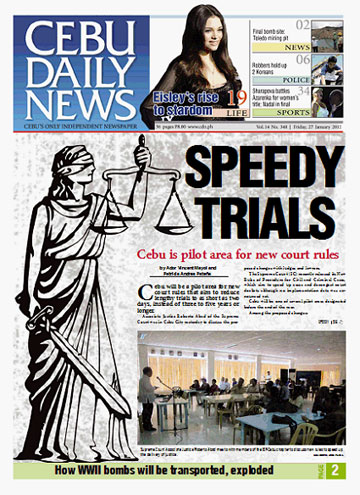Cebu is pilot area for new court rules

Associate Justice Roberto Abad of the Supreme Court was in Cebu City yesterday to discuss the proposed changes with judges and lawyers.
The Supreme Court (SC) recently released its New Rules of Procedure for Civil and Criminal Cases, which aim to speed up cases and decongest court dockets although no implementation date was announced yet.
Cebu will be one of several pilot areas designated before the end of the year.
Among the proposed changes:
* Witnesses can use local languages and dialects.
Article continues after this advertisement* Courts have to hear a case in one sitting except in some complex cases.
Article continues after this advertisement* Free-flowing testimonies of witnesses will have no interruptions from lawyers.
* Proceedings will use electronic recording of the proceedings.
* The verdict will be verbally announced right after the trial.
* Court schedules will start on time. Latecomers will be fined P1,000 to P5,000.
“Our system for hearing and deciding cases is no longer working for us. Can we still fix it? Let us not say, ‘Walang mangyayari sa iniisip nating pagbabago (Nothing will happen with our plans for change).’ Let us rather say, ‘Mangyayari kung gugustuhin natin. (Change will happen if we want it to),’” Abad told 25 participants in the Integrated Bar of the Philippines (IBP) conference room.
He said the causes of delay are many.
“Our courts remain few. Many lawyers seek postponements. There are often indiscriminate objections to questions. The judge is excessively lenient. More cases are filed each year than our courts are able to dispose of,” Abad explained.
“Forty percent of persons accused of crimes walk away free because complainants and witnesses stop coming after too many postponements,” he added.
This early, some Cebu lawyers expressed reservations that some of the changes were impractical.
Abad, however, said the new procedures are not radical changes and have, in fact, been practiced by other countries for a long time.
In its order, the High Court said dockets of trial courts remain heavily congested especially in big cities and that cases are postponed because judges are unable to hear 30 to 60 cases a day in their court calendars.
“These delays cause parties to simply give up and forego their remedies,” the SC said.
Some of the changes the SC wants to implement will shorten the trial procedure.
Witnesses who testify can narrate their claims in a free-flowing fashion without being interrupted by lawyers’ objections.
“Trial is no longer treated as afield of contest,” the associate justice said.
Schedules will be followed promptly.
“The court shall proceed to hear the case promptly at the designated time and shall not wait for the parties, counsels, or witnesses who are late,” the rule states.
Those who come late have to pay a fine of P1,000 to P5,000. If the lawyer is tardy, the fine should be paid from his own pocket and not charged to his client or else the lawyer faces disbarment.
Court stenographers will still take take detailed notes of the proceedings but the notes shall be “secondary” to the electronic recording.
The SC also wants to allow witnesses, including the questions asked of them, to be in the vernacular or any local dialect.
At present, the courts use the English language in the proceedings and other languages and dialects have to be translated.
Under the revised rules, the testimonies “shall be preserved and used in their original version” and not rely on the English translation.
Courts are mandated to hear a case in one sitting except in some complex cases.
The verdict will be announced face-to-face with the parties present right after trial, and the judge’s written decision has to be handed down within 15 days.
PROCESS
Under the new rules, there will be only two stages of a hearing: preliminary conference and an adjudication hearing.
If a plaintiff fails to appear at the conference, the court shall dismiss the case.
The adjudiciation hearing will assemble all the parties and their witnesses who shall be examined based on their affidavits.
Abad said half of the trial is finished after the submission of the affidavits.
The accused in criminal cases may also submit their counter-affidavits to speed up the proceedings.
This early, some lawyers in Cebu said the changes were impractical.
But Earl Bonachita, president of the IBP Cebu City Chapter, said the High Court should be given a chance to carry out the changes.
“That will first be experimental and we will assess it as soon as implementation is being done. If implementation is successful, then maybe it will be implemented all over the country,” he said.
Lawyer Democrito Barcenas said the shortened procedure may be allowed for civil cases but was not applicable to criminal cases.
“In civil cases, it may be okay to remove the cross-examination and rely solely on affidavits. However, in criminal cases, the accused has the right to confront the accuser through a lawyer and a cross-examination. I think that cannot be dispensed with. I don’t think that’s possible under the present constitution,” he told Cebu Daily News.
Barcenas said the SC should fill up court vacancies and judges should avoid being absent if they want to resolve cases quickly.
He said there is even a need to add trial courts.
Lawyer Inocencio de la Cerna said the new rules were not feasible for judges in Cebu who are assigned to hear numerous cases every month.
“It expedites the dispensation of justice but might unduly put more load on the already overly burdened Judges of the MTC and RTC,” he said.